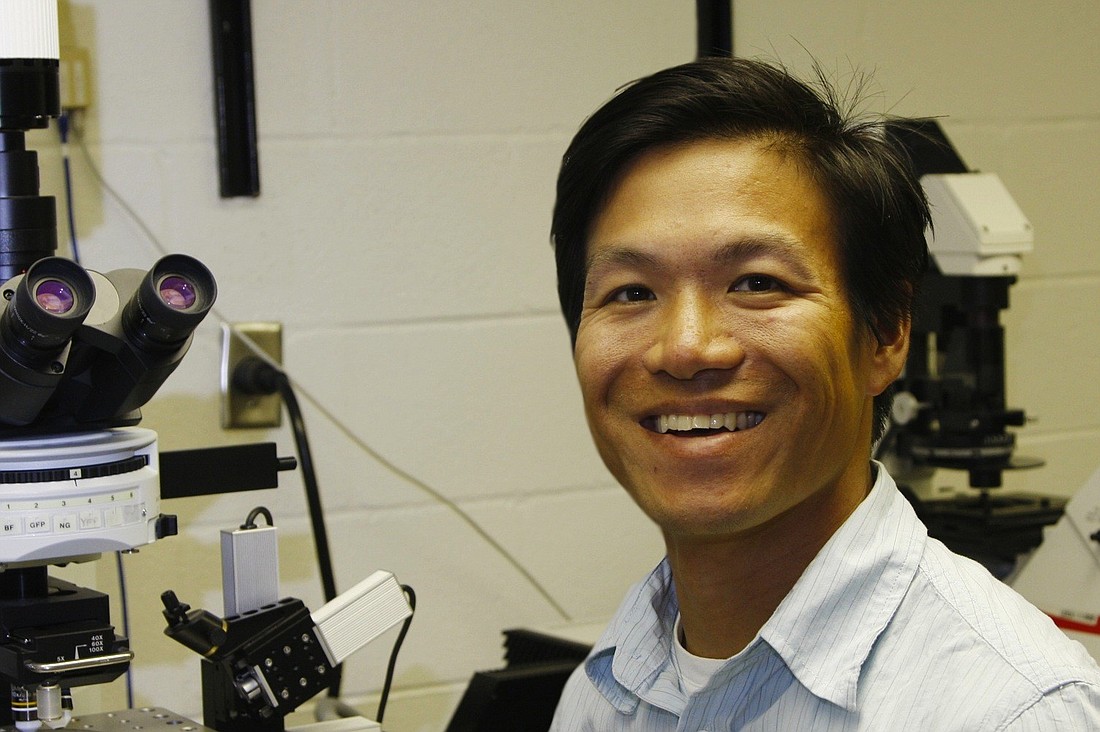- April 28, 2024
-
-
Loading

Loading

To study human hearing, one scientist is turning to an unlikely place: the skin of the zebrafish.
At the Whitney Laboratory for Marine Science, at the northern edge of Flagler County, Dr. James Liao and his fellow researchers have three years and a $516,000 grant from the National Science Foundation to explore his theories. Liao, who secured the grant on July 1, has been a full-time researcher at the Marineland-based lab since 2009, studying the movement and anatomy of zebrafish.
The fish, which grow to be no longer than a sewing needle, have hair cells on the surface of their skin that are similar to those found in the inner ears of humans. Liao attributes the cell similarities to evolution.
Liao said the point of studying the zebrafish hair cells is to learn more about human hearing imbalances, and to better understand how a healthy auditory system functions. Studying zebrafish larvae is easier because they are transparent, and examining the fish is less invasive than studying humans.
“We’re using a simple system to understand complex concepts,” he said. “We’re essentially trying to understand what the healthy situation is like.”
Currently, he is studying neurons and the lateral system by looking at cell activity and “mapping out” the brains of the tiny fish.
Liao and his team of post-doctorate researchers are also searching deeper into the cell layout of fish and how they detect water flowing past their bodies. Fish movement is a large part of his studies.
“We’re interested in how living animals sense their environment,” he said.
From duck pond to Marineland
Liao said his interest in marine biology started when he was just 8 years old. He was born in Brooklyn, N.Y., to Taiwanese immigrants and at age 6, he moved to Pleasantville, N.Y. He said his parents would take him to a duck pond where he would catch frogs and minnows to take home and raise. He would also go to public libraries to read books by Jacques Cousteau, and, in high school, he traveled to Maine to study whales.
“I really became fascinated with the natural world,” he said.
The aquatic passion continued. He later earned an undergraduate degree in biology from Wesleyan University in Middletown, Conn., before receiving master’s and doctor of philosophy degrees in biology from Harvard University. He completed post-doctoral studies in neurobiology at Cornell University, where the interest in zebrafish began. He has also taught at the University of Florida as an assistant professor of biology.
The gift — and pressure — of a grant
He decided to study at the Whitney Lab because of the easy access to the ocean.
But without his grants, the work would have been difficult. Liao said applying for grants is an essential part of researchers’ work, as it heavily funds their studies and staff. He reported his data and work findings in the application.
“You have to produce something on a regular basis,” he said. “You work as much as you need to. You can’t go nine to five.”
He is also funded by the National Institute of Health.
He said through his current research, he would like to make more discoveries and perhaps give information to people working in the medical field.
“We’re poised to be able to make a strong contribution,” he said.